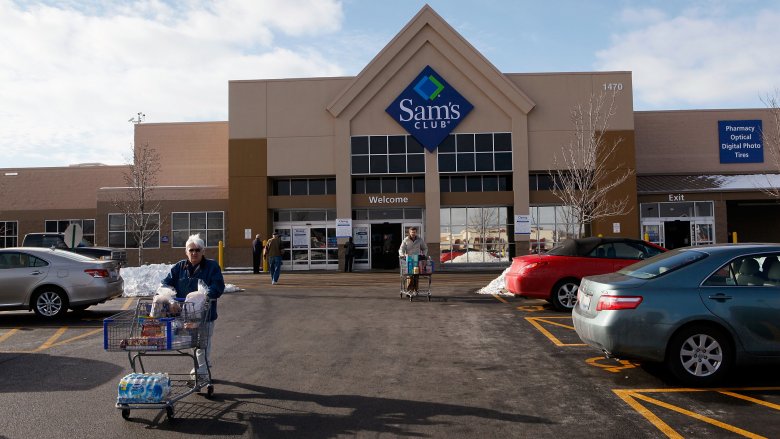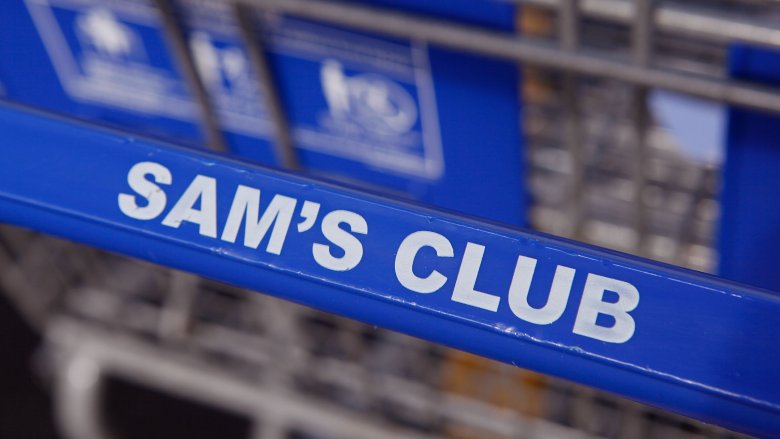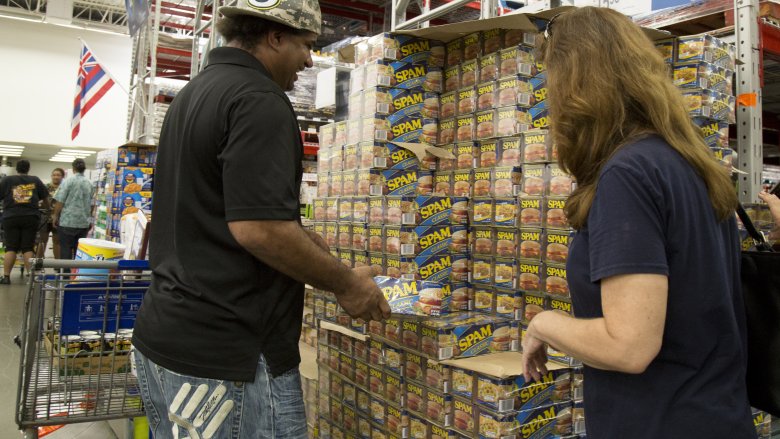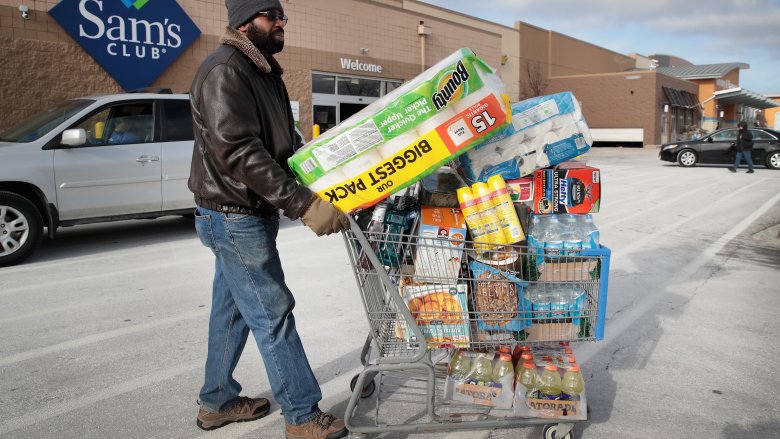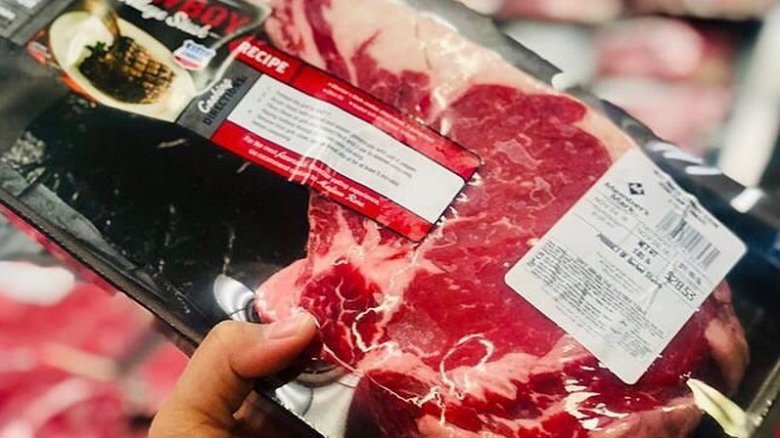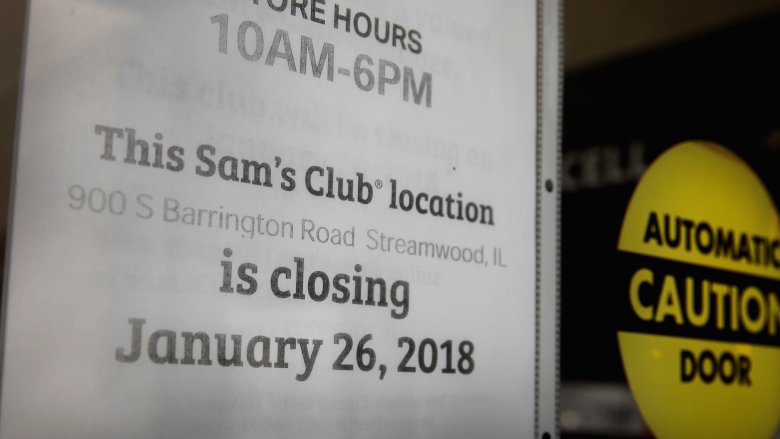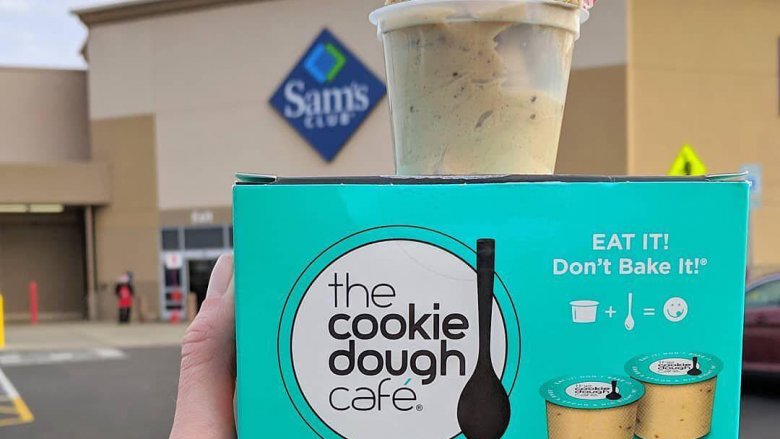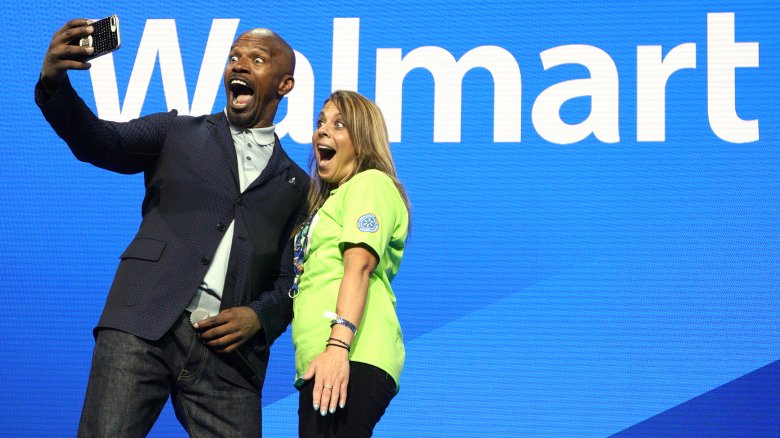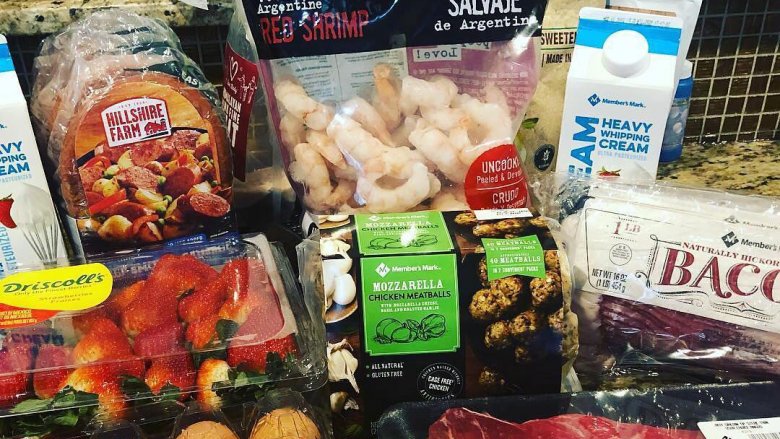Shady Things Sam's Club Doesn't Want You To Know
There's a reason so many consumers are willing to spend their hard-earned money on an annual membership fee to shop at warehouse superstore Sam's Club: they feel they're getting some of the best deals out there, and they love the products they're able to purchase. Sam's Club is also a favorite among many because of the popular items they offer customers — for example, giant inflatable pool floats and super cheap 2-pound slabs of bacon.
But it's not always all good news for this Walmart warehouse store: Sam's Club has had its fair share of ups and downs, and they usually try to do their best to hide those downs from their members and the general public as a whole (can you really blame them?). The truth will always come out, though, and there are some shady things the company doesn't want you to know about their business practices. Whether you're a member or thinking about becoming one, you should know these truths abut Sam's Club:
They may have sold some things they shouldn't have
One of the things Sam's Club is known for, like many warehouse stores, is selling brand-name items (not just food!) for a significantly lower price point than the competition. But as it turns out, they haven't always had permission to sell the things they've advertised. One example is when bicycle company Trek publicly stated their shock at their bikes being sold at the warehouse. In 2016, Sam's Club listed some men's and women's Trek mountain bikes on their website, available to be purchased online only, for more than $100 cheaper than the Trek site. A Trek spokesman told BRAIN that Sam's Club "did not acquire them from Trek directly," saying they were investigating how they got the bikes. He added, "Trek has no plans to sell bikes at Sam's Club or any other big box retailer."
And in 2006, a similar situation happened with designer brand Fendi. CNN Money reported that the brand sued Sam's Club for selling knock-off handbags, wallets, and key chains at their stores, saying that "Walmart does not have a purchasing agreement with Fendi or anyone affiliated with the company." The bags were being sold for discounted prices, as low as $295 in some cases, where Fendi claimed the original version would retail for $925. A spokesman for Walmart said "the company policy prohibits the retailer from selling knock-offs" and defended their brand.
They got in trouble with Medicaid
Sam's Club stores also offer a pharmacy that is a convenience for many guests. But in 2018, the company got in trouble with Medicaid for certain practices that were going on. According to a press release from the U.S. Attorney's Office for the District of Minnesota, there was a complaint that both Walmart and Sam's Club pharmacies regularly enrolled Medical Assistance (Medicaid) beneficiaries in the companies' auto-refill program and then billed Medicaid for prescriptions. This was a violation of state rules and regulations, as Minnesota (and 20 other U.S. states) does not allow pharmacies to automatically refill prescriptions paid for by the state's Medicaid program without an explicit request from the beneficiary.
Allegedly, pharmacy employees were the ones who reported the violation to the company managers, but even after they did, Walmart and Sam's Club kept automatically refilling prescriptions. In the end, Walmart Stores, Inc. and Sam's West, Inc. agreed to pay a total of $825,000 to resolve False Claims violations.
They got a judge committed
As a giant, well-known company, it's no surprise that Sam's Club has been part of many, many lawsuits during their time. A few stand out, though, like this one, where it appears Sam's Club employees may have gotten a judge committed. In 2010, Consumerist reported that a 46-year-old municipal judge from Brownsville, Texas, had filed a lawsuit against Sam's Club and Walmart Stores Inc. for a terrible customer service experience that resulted in him being arrested and having an involuntary commitment to two mental health facilities.
The judge said he went in to Sam's Club to buy diamond earrings for his wife, and employees questioned him about his purchase. A verbal dispute ensued, and it got bad enough that the judge was arrested and then confined to a mental health facility. He was released two weeks later after a court deemed him harmless to himself and others, but then a few days later, his friends and family had him hospitalized in a second facility because of "worrisome" behavior. He received court-ordered treatment and was released, but then went on to sue Sam's Club for making a "false report to the Brownsville Police Department alleging [he] was guilty of disorderly conduct and terroristic threats."
They were sued for disability discrimination
You know those free samples the store is known for? Well, they've caused a whole lot of trouble for the company. In 2018, Sam's Club was hit with a federal lawsuit by the U.S. Equal Employment Opportunity Commission (EEOC) on behalf of hundreds of workers who hand out all of the free food samples at both Walmart and Sam's Club stores. According to the St. Louis Post-Dispatch, the lawsuit claimed that their bosses were violating disability protections, saying that when Crossmark Inc. of Plano, Texas, took over, they put in place policies that violated the Americans with Disabilities Act.
The EEOC mentioned a few examples, like one about a worker who was allowed to use a stool while handing out samples... until Crossmark took over. They not only denied her permission to sit, but they also fired her from her position. The lawsuit asked for "monetary damages for members of the proposed class of affected workers and a judge's order that would require the company to prevent future discrimination."
...and for discrimination of a transgender employee
The disability lawsuit wasn't the first time Sam's Club was sued for discrimination. In 2017, the company was sued for discriminating against a transgender employee in a case that attracted a lot of public attention. According to the Chicago Tribune, Charlene Bost, a transgender woman, sued Sam's Club, saying she had been wrongfully fired from a North Carolina Sam's Club after she repeatedly complained about harassment from her co-workers.
Bost began working at the store in 2004, and didn't begin transitioning into her feminine identity until 2008. She alleged that prior to the public transition, she received a lot of praise and got a promotion to supervisor. According to Bost, the harassment began when she was transitioning, and she claimed co-workers called her "that thing with an attitude." She also said she was repeatedly harassed by her direct supervisor, who called her "it" in front of other employees and took part in unwanted physical contact, along with writing fake infractions against Bost that led to her being fired.
Bost asked for unspecified monetary damages and wanted the court to order Sam's Club to train employees in order to prevent future harassment of other transgender employees.
They made employees work for free
The way Sam's Club treats employees has clearly been questionable for a while, displayed again in two separate lawsuits. In 2002, the New York Times reported that there was a class-action lawsuit, as well as individual lawsuits, against Walmart and Sam's Club across 28 states for not paying employees for working off-the-clock. One former employee, Verette Richardson, claimed she sometimes worked for up to three hours without getting paid, saying, "They wanted us to do a lot of work for no pay. A company that makes billions of dollars doesn't have to do that."
In response, a Walmart spokesman said, "Off-the-clock work is an infrequent and isolated problem, which we correct whenever we become aware of it. It is Wal-Mart's policy to pay its employees properly for the hours they work."
There have been similar lawsuits since. According to NBC, a California jury awarded Walmart workers $172 million for illegally denied lunch breaks in 2006, while they settled a similar case in Colorado for $50 million. That same year, a judge approved a class-action lawsuit against Walmart Stores Inc. by employees in Pennsylvania who said they were pressured to work off-the-clock. And in 2018, a class-action lawsuit against Walmart and Sam's Club was reported as well, challenged their "timekeeping practices that allegedly fail to account for off-the-clock pre- and post-shift work."
Their freshness guarantee might not mean much
In 2014, Sam's Club was slapped with another class-action lawsuit, this one entirely different: it was about their freshness guarantee, which may not have been as great as it claimed to be. South Carolina customer Myriam Fejzulai, a Sam's Club member of eight years, claimed that Sam's Club had repeatedly violated their freshness guarantee, with her and other customers, which claimed that there is a "200% money-back guarantee on all fresh meat, seafood, bakery and produce. Non-Members receive 100% money-back guarantee." Members have a choice of getting back 200 percent or a full refund of the original price plus the replacement of the item.
Fejzulai said she had returned a significant amount of "fresh meat, bakery, and produce items" over several years, and claimed she had never been refunded more than the purchase price of the item or offered the return purchase plus a replacement product. The lawsuit stated, "Given that Sam's has, on information and belief, over 47 million members, plaintiff alleges that Sam's has failed to honor the 200% Freshness Guarantee for many thousands, if not millions, of its members."
According to Top Class Actions, the class action settlement resolved this claim in 2018, along with a similar but separate case filed in California, with Sam's Club offering a $6 million settlement fund.
You might not be saving as much as you think
The allure of shopping at a place like Sam's Club isn't just buying food in bulk — it's mainly about saving money on necessary items. But the value of the products stores like Sam's Club sells has been questioned before, a report on Fox Business says that you may not be saving quite as much as you think you are with this membership.
The report points out that the prices are, indeed, lower at a place like Sam's Club compared to a store like BJ's or traditional grocery stores. Michael Clayman, editor/writer at Warehouse Club Focus, told The Motley Fool (via Fox), that the results of price reporting "show the dramatic savings a consumer receives by shopping at a club compared to the other two."
But here's the thing: it isn't just about price. Billie Blair, an organizational psychologist and CEO of Change Strategists, Inc., said that because of "membership fees, wastage from overbuying (products and such), the necessity to buy in quantity (canned goods that sit on shelves and have to be discarded), etc." most "warehouse clubs almost never save money for the individual shopper." In other words: if you are throwing away food because you bought too much of it, plus paying an annual fee, you likely aren't saving anything. If you shop smart by buying only what you need and will use, then you have the potential to save — otherwise, you're out of luck.
The CEO was accused of prejudice against white men
In 2015, former Sam's Club CEO Rosalind Brewer, the first woman and first African-American to lead a division within Walmart, went under fire for comments that some perceived as prejudice against white men. In an interview with CNN, Brewer discussed the diversity she "demands" of her team, saying that it's something she also discussed with her suppliers. She said that during one meeting with a supplier, "The entire other side of the table was all Caucasian male. That was interesting." She added that she didn't want to talk with them since there was no other female, and that she was "going to place a call" to the supplier about it.
Her comments immediately received backlash on social media, with people calling Brewer "racist" and using the hashtag #boycottracistsamsclub to rally supporters. Doug McMillon, Walmart President and CEO, wrote in a statement that they supported Brewer, saying, "Roz was simply trying to reiterate that we believe diverse and inclusive teams make for a stronger business. That's all there is to it and I support that important ideal."
They were criticized for closing stores with no notice after announcing a pay raise
In January 2018, Walmart announced that they would be closing 63 Sam's Club stores nationwide, turning them into fulfillment centers for online orders. According to CBS News, CEO John Furner said, "We know this is difficult news for our associates, and we are working to place as many of them as possible at nearby locations," adding that, "we're making these decisions as part of running a healthy business."
A controversy ensued about the thousands of employees who would get laid off. The announcement came on the same day that Walmart announced it was raising its minimum wage to $11 per hour. According to the Washington Examiner, the company had also announced that they would be giving employees up to $1,000 in bonuses because of new tax cuts. According to Business Insider, most of the employees being laid off weren't even aware of what was happening until they showed up for work that day. Some learned of the store closings because of signs on the locked doors. Many felt the surprising closings were handled in the wrong way.
There are some items that definitely aren't worth buying there
It may have been proven that prices at Sam's Club are on the lower end of the spectrum when it comes to other big box retailers and grocery stores, but that doesn't mean that everything is a great buy. Experts told Market Watch that while some things are almost always a good deal (like car parts, medication, and alcohol), there are a few items you shouldn't bother buying in bulk.
Books, CDs, and DVDs can be found cheaper on Amazon, according to experts. Jon Lal, CEO and founder of BeFrugal, said to avoid buying food perishables, such as condiments like mayo and ketchup, explaining that those bulk items will probably go bad because you can't consume them in time. Erin Konrad, a spokesperson for CouponPal, said that diapers can be found cheaper at places like Target and Amazon. Matthew Ong, the retail analyst for NerdWallet, told Market Watch that laundry detergent in bulk can lose its efficacy quickly, meaning you'll probably waste money on that because you won't be able to use it in time. Lastly, Konrad and Ong agreed that paper goods (like toilet paper and tissues) can be found cheaper in Target or grocery stores with coupons.
They've been criticized for not treating employees as well as Costco does
One of Sam's Club's biggest competitors is Costco, another big box retailer known for great prices and especially for treating their employees very well. Costco has been praised for excellent wages and benefits, and it seems that Sam's Club just can't compare. In 2008, Slate reported that Sam's Club employees made a starting wage of $10 an hour and made $12.50 after four and a half years. A new Costco employee started at $11 an hour, made $19.50 after four and a half years, plus received "extra checks," a bonus of more than $2,000 every six months.
There are some reasons for this: one is that, according to Slate, Costco sells more pricey items than Walmart and Sam's Club does. Costco employees can also be members of the Teamster's union, while no Walmart employees are.
So why doesn't Sam's Club offer the same wages? Tim Worstall at Forbes believes it may do more harm than good, saying, "[About] 700,000 people would lose their jobs at Wal-Mart. Which is, I think you'll agree, a fairly large result and one that casts a certain amount of doubt on the idea that raising wages has no unemployment effects."
Many feel Costco is the better option for food quality and prices
Sam's Club and Costco clearly get compared a lot, and another thing people like to do is pit their products against each other. When MSN compared the two in 2018, it was decided that they had "settled on Costco — by a hair." This was due to a "very narrow price advantage:" Sam's Club has a cheaper annual membership, but Costco had better overall savings. MSN also found that Costco had a larger in-store selection, higher-end merchandise, discounted prescriptions, and greater rewards. Sam's Club, on the other hand, did better with technical support for electronics, provided more payment options, and had more locations.
As for more specific products, The Kitchn, for example, did a taste test comparing Sam's Club rotisserie chickens with Costco rotisserie chickens. They concluded that the rotisserie chicken at Costco tasted better. In one Reddit thread, a user wrote, "I've shopped at both, they're similar, but Costco just consistently wins for quality and taste in my opinion." Another user agreed, saying, "I pick Costco every time. I like the meat quality better and Kirkland brand is legit for almost everything. AND they treat and PAY their employees well." Costco seemed to be the favorite overall.


